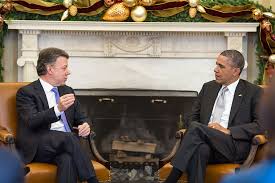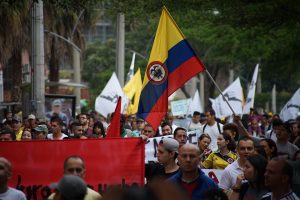In Colombia, it’s a common phenomenon to be corrected on how best to spell the name of this amazing country. But the practice has grown beyond grammar-nazis catching people unawares. It’s a movement, a meme and a T-shirt. Yet, despite the good intentions of those behind this cause, many native speakers of English continue to mistake ‘Columbia’ for the accepted spelling ‘Colombia’. As it turns out, the reasons for doing so are neither a lack of education nor a sign of disrespect. On the contrary, English speakers may in fact be justified in using ‘Columbia’ as an alternative spelling.
To begin with, no one is taught to spell ‘Colombia’ with a ‘u’. The country is rarely discussed in schools across English-speaking countries. Most atlases, the rare place where a school kid might acquaint themselves with Colombia, would carry the correct spelling when labelling the country. In addition to this, people who misspell ‘Colombia’ come from all walks of life; they are doctors, politicians, labourers and businesspeople. So the idea that people misspell ‘Colombia’ out of ignorance or a lack of education doesn’t quite ring true. It’s also unlikely to be a global conspiracy to enrage Colombians as the same mistake persists in the UK, US, Australia, New Zealand, Canada, India and any region where English is widely spoken. So there must be some other reason inherent to the English language for this error to pop up independently in so many diverse locations.

This Colombian child just saw a gringo misspell ‘Colombia’.
In fact, most people misspell ‘Colombia’ because ‘Columbia’ is what it sounds like when it’s spoken out loud. The ‘-lom-’ in ‘Colombia’ is pronounced like ‘lum’ in ‘lumber’. Similarly, the second ‘o’ in words like ‘colon’ and ‘Colorado’ sound more like ‘colun’ and ‘Colurado’. These words also place the accent on the first syllable rather than the second. With ‘Colombia’ however, the accent is universally on the second syllable among English speakers and this causes some confusion among people who don’t often see the word written down. What happens then is that the brain ‘guesstimates’ what the spelling might be based on the words it already has in its lexicon. For many, this might be equating it with the homonym ‘Columbia’ which exists in greater frequency by way of names like ‘Columbia University’, ‘British Columbia’ and ‘Columbia Pictures.’ Furthermore, the etymology of the name ‘Colombia’ is from the explorer who initially founded the continent. In English—gulp—there’s a ‘u’ in ‘Christopher Columbus’.
So the reason why many foreigners mistake ‘Columbia’ for ‘Colombia’ is not out of disrespect; it’s just the brain making do for a word that it has rarely encountered. But here’s where the story gets interesting. What if what’s occurring here is more than just multiple phonological mistakes made worldwide? What if this is evidence that the spelling of the word is in fact in the process of being changed in the English language?

Tense diplomatic discussions with Santos took place at the White House as Obama mistakenly wished ‘all Columbians Happy Holidays’.
To be sure, all language-communities have the prerogative of naming a country exactly as it pleases. This is why we say ‘Germany’ and not ‘Deutschland’. It’s why ‘Italy’ isn’t ‘Italia’ and why ‘Japan’ isn’t ‘Nihon’. This works for cities too as names like ‘Bogotá’ and ‘Medellín’ don’t retain the accents in the English language. Other languages act on this prerogative as well, with many changing the spelling of countries to accommodate their own sounds in the alphabet. For example, Germans spell ‘Colombia’ as ‘Kolumbien’ and the Spanish say ‘Nueva Zelanda’ for ‘New Zealand’. So if a language community decided to change the spelling from ‘Colombia’ to ‘Columbia’, they would be perfectly within their rights to do so. But how would that change happen?
Unlike the French, English speakers have few central authorities to turn to for guidance on spelling. One could, for example, point to the CIA World Factbook or the Oxford English Dictionary for the correct spelling of a country but these are rarely seen as infallible authorities that people turn to for guidance. By way of example, it is formally correct as of 1991 to say ‘Ukraine’ instead of ‘the Ukraine’, though many do not accept the latter to be an error. The Ukranians however, have been stoic in their reaction to this common English blunder and the movement #itsUkrainenottheUkraine is yet to gain momentum.

Protests raged in Colombia over continued use of the word ‘Columbia’ by foreigners.
So in the absence of a centralised authority or ‘spelling police’, it may be the case that the spelling of ‘Colombia’ will turn out to be precisely what the majority of English speakers say it is. The Austrian philosopher Ludwig Wittgenstein’s celebrated dictum ‘meaning is use’ comes to mind when speaking of how a language community can determine the rules of their language by using it in a specific way, and that there is no correct language beyond the community of speakers. It’s entirely possible that in a decade, like many words in the English language that have more than one accepted spelling, ‘Columbia’ will be a perfectly acceptable alternative spelling to ‘Colombia’.
Which is why when someone corrects the way you spell ‘Colombia’, you can rest easy that it isn’t because you’re ignorant; you’re just a participant in an evolving language and you have chosen to side with the majority of English speakers that spell it the way it sounds. As a native speaker of English, you’re perfectly entitled to spell it the way the people in your community do.
Unless of course you just read this article. In which case there’s no excuse for your gringo ass to keep spelling it ‘Columbia’.





